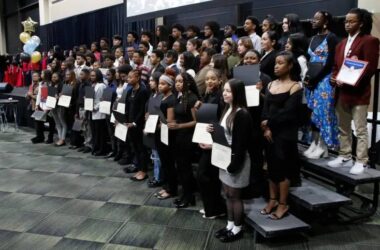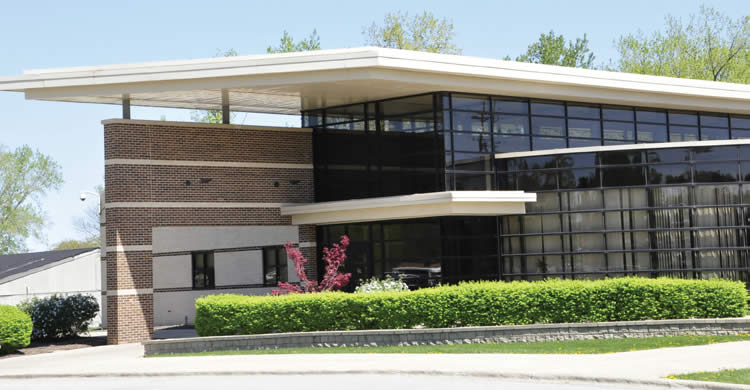CHICAGO–(ENEWSPF)–February 9, 2015. ‘Capitalistic Crisis: Renganomics,’ a collaborative and spontaneously-written poem by Roosevelt University students on the state of the U.S. economy, is the lead story in the January issue of International Journal of Pluralism and Economics Education. (Pictured above, from left, are student poets Cathleen Vasquez, Jacob Lundquist and Joseph Molina).
Written by Roosevelt University Economics Professor Stephen T. Ziliak, the article entitled “The spontaneous order of words: economics experiments in haiku and renga” makes the case for having students write poetry that can engage them in conceptualizing economics.
“It’s incredible what students can come up with in just 45 minutes time about our economy,” said Ziliak, who was so impressed by students’ verses on everything from the U.S. debt crisis to the Wall Street boom that he wrote an article about his experience.
A published economics haiku writer who has used poetry to teach economics for more than two decades, Ziliak assigned about 50 students in one of his beginning economics classes last spring to write haikus on economics.
With 17 syllables in three lines of five-seven-five beats, the student haikus became the basis for a second forgotten kind of Japanese poetry known as the renga.
A medieval art form and social activity, renga essentially links haikus with two-line refrains of seven syllables each that are written by a group of participants whose aim is to react and express itself spontaneously on the topic or topics of the individual haikus that are being joined together.
As Ziliak notes, however, this is a long lost tradition, which elevates Roosevelt students’ recently published renga as the only example out there to focus solely on economics.
“Economics can be confusing and boring, but this made it fun,” said business marketing major Cathleen Vasquez, who wrote Capitalistic Crisis: Renganomics with fellow Roosevelt students Joseph Molina, Jacob Lundquist, Cameron Simak and Morgan Higgs. “I actually was able to grasp more of the concepts we were learning by writing a renga,” she said.
Experimenting with the poetry form for the first time in April 2014, Ziliak asked students in his Principles of Economics II class to bring in five original haikus about economics for a competition. The students then were assigned to teams. Each group was told to take 45 minutes to come up with refrains transforming their haikus into rengas. ‘Capitalistic Crisis: Renganomics’ was selected as the winner.
“Economics is a dry subject but this got me thinking differently about what I was learning,” said business management major Joseph Molina, a Roosevelt student who wrote refrains near the middle and at the end of Capitalistic Crisis: Renganomics that weigh in on President Barack Obama’s role in shaping the U.S. economy.
Drawing under one umbrella ideas about the economy’s capitalism, class warfare, stock market, global interconnectedness, debt, government lies, materialism, The Great Recession, mortgage foreclosures, etc., the winning poem’s narrative so moved Ziliak that he decided to cite it in full.
“So far as we know this is the first spontaneous renga in English, or any language, to focus on economics,” Ziliak writes in the International Journal of Pluralism and Economics Education, which themed its January 2015 issue around moving “away from traditional chalk and talk pedagogy and towards experiential and active learning.”
Citing evidence showing increasing numbers of college students and faculty want more interactive, “big-think” activities in the core economics curriculum, Ziliak states in his article that “one way forward is to identify low-cost collaborative learning models that foster creative cooperation and growth through spontaneous competition.” One way forward, he suggests, may be the renga.
“I believe that students should have a voice and personal stake in economics and I think the renga is an effective way to increase the level of dialogue in the classroom,” added Ziliak, who plans to hold a second renga competition as part of the Principles of Economics II course that he is teaching during the current spring 2015 semester at Roosevelt.
Source: www.roosevelt.edu









